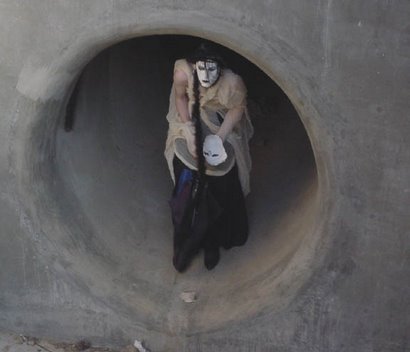Because my previous post was too much sap and I needed to cleanse my palate, a few thoughts in response to j's points about poetic aesthetics that he clarified (and yes, the clarification did help, but there are a few dead horses I would like to beat, thanks).
1. It's amusing to act as though the poems that take chances are always the more modern, form-resistant ones. Sadly, most modern poems have the burden of working within the contexts of preexisting genres and forms, thus being forced always to reinvent what came before. Neat narrative arcs, tercets and quatrains might certainly seem "conservative" but in reality represent the original shaping of a genre ex nihilo. It's a bit like condemning the phrase "the apple of one's eye" as a cliche - the passing of time has rendered the phrase cliche, not the phrase itself: when it was written the first time it was as original as anything 'new' and 'edgy' might be. Newer poems may seem form resistant or edgy, but give it a couple of years and they'll be as conservative and trite as anything on the market. Also, finding one memorable image/phrase per "conservative" poem, I would argue, is simply skimming the poem for an easy, surface interpretation that is easily rewarding when in reality a close reading would offer something much more complex.
Another thought. Some authors 'reinvent' traditional forms. That's good, yes? But the authors who are working in 'non-traditional' forms are reinventing the traditional forms as well, if only by working on their inverse. There really is nothing new under the sun.
1a. A lack of stringest logic is, in fact, the foundational base of New Criticism. The interpretation of a poem, this school of thought argues, lies in the inherent (seeming) logical paradox of any poem. Thus interpretation (of the logical sort) always stems from illogic of a kind.
1b. I need to take the word 'traditional' out of j's vocabulary. However, his comments on said abstractions are actually quite a champion for older more obscure schools of poetry.
1c. I would argue that the epistemology outside of a poem itself is always reader-produced, but that may be just me. It's only natural to want to impose order on chaos.
2. A good poem that gets it work done quickly. Well, I imagine that's possible. But if you want to compare poetry to sex, well. Sometimes a quickie is okay, but it takes a marathon night to enjoy the full experience (i.e., Keats, The Eve of St. Agnes.)
And THAT is my contentious, Romantic, old-poet-worshipping response. ....I couldn't help myself.
- b-

Thursday, February 15, 2007
Subscribe to:
Post Comments (Atom)

1 comment:
You shrug these things off as though they're just offhanded critiques, but you have some good - although horribly, horribly Romantic - points of view on the subject. Insofar as point #1, I hear the ghost of William Wordsworth speaking through you. It's scary. But I like it.
day o'thane
(a student left that spelling of a name in a note on my door. i wasn't sure whether i ought to be offended or rewrite myself into Macbeth)
Post a Comment